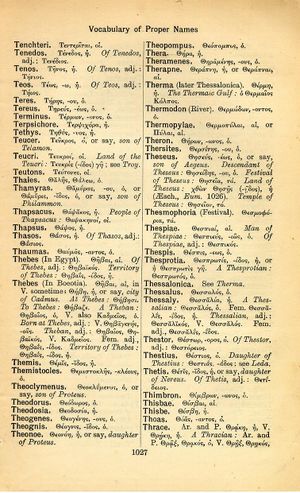Thestius
From LSJ
αἰθὴρ δ᾽ ἐλαφραῖς πτερύγων ῥιπαῖς ὑποσυρίζει (Aeschylus, Prometheus Bound 126) → The bright air fanned | whistles and shrills with rapid beat of wings.
English > Greek (Woodhouse)
Θέστιος, ὁ.
Daughter of Thestius: Θεστιάς, -άδος: see Leda.
Latin > English (Lewis & Short)
Thestĭus: ii, m., = Θέστιος,>
I a king of Ætolia, father of Leda and Althæa, and of Plexippus and Toxeus, Ov. M. 8, 487; Hyg. Fab. 77; 155; 174.—Hence,
A Thestĭă-des, ae, m., a (male) descendant of Thestius: duo, i. e. Plexippus and Toxeus, Ov. M. 8, 304 and 434: respice Thestiaden, i. e. Meleager, son of Althæa, id. F. 5, 305. —
B Thestĭas, ădis, f., the daughter of Thestius, i. e. Althæa, Ov. M. 8, 452; 8, 473; id. Tr. 1, 7, 18.
Latin > French (Gaffiot 2016)
Thestĭus, ĭī, m., père de Léda, etc. : Ov. M. 8, 487 ; Hyg. Fab. 77.

